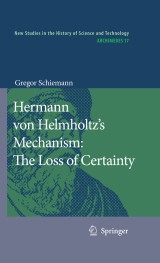Details

Hermann von Helmholtz's Mechanism: The Loss of Certainty
A Study on the Transition from Classical to Modern Philosophy of NatureArchimedes, Band 17
|
96,29 € |
|
| Verlag: | Springer |
| Format: | |
| Veröffentl.: | 11.12.2008 |
| ISBN/EAN: | 9781402056307 |
| Sprache: | englisch |
| Anzahl Seiten: | 300 |
Dieses eBook enthält ein Wasserzeichen.
Beschreibungen
Focusing on Hermann von Helmholtz, this study addresses one of the nineteenth century’s most important German natural scientists. Among his most well-known contributions to science are the invention of the ophthalmoscope and grou- breaking work towards formulating the law of the conservation of energy. The volume of his work, reaching from medicine to physiology to physics and epis- mology, his impact on the development of the sciences far beyond German borders, and the contribution he made to the organization and popularization of research, all established Helmholtz’s prominence both in the academic world and in public cultural life. Helmholtz was also one of the last representatives of a conception of nature that strove to reduce all phenomena to matter in motion. In reaction to the increasingly insurmountable difficulties that program had in fulfilling its own standards for s- entific explanation, he developed elements of a modern understanding of science that have remained of fundamental importance to this day.
Mechanism Between the Classical and the Modern Conception of Science.- The Conception of Mechanism.- The Classical Conception of Science.- Three Traditions in Mechanism.- Contours of Modern Philosophy of Nature.- Helmholtz's Mechanism at the Dawn of Modernity.- Helmholtz, a Bildungsbürger, Scientist, and Research Strategist.- Helmholtz’s Classical Mechanism.- The Hypothetization of Helmholtz’s Mechanism.- Conditions and Causes for the Change in Helmholtz’s Conception of Science and Nature.
<P>Two seemingly contradictory tendencies have accompanied the development of the natural sciences in the past 150 years. On the one hand, the natural sciences have been instrumental in effecting a thoroughgoing transformation of social structures and have made a permanent impact on the conceptual world of human beings. This historical period has, on the other hand, also brought to light the merely hypothetical validity of scientific knowledge. As late as the middle of the 19th century the truth-pathos in the natural sciences was still unbroken. Yet in the succeeding years these claims to certain knowledge underwent a fundamental crisis. For scientists today, of course, the fact that their knowledge can possess only relative validity is a matter of self-evidence.</P>
<P></P>
<P>The present analysis investigates the early phase of this fundamental change in the concept of science through an examination of Hermann von Helmholtz's conception of science and his mechanistic interpretation of nature. Helmholtz (1821-1894) was one of the most important natural scientists in Germany. The development of this thought offers an impressive but, until now, relatively little considered report from the field of the experimental sciences chronicling the erosion of certainty.</P>
<P></P>
<P></P>
<P>The present analysis investigates the early phase of this fundamental change in the concept of science through an examination of Hermann von Helmholtz's conception of science and his mechanistic interpretation of nature. Helmholtz (1821-1894) was one of the most important natural scientists in Germany. The development of this thought offers an impressive but, until now, relatively little considered report from the field of the experimental sciences chronicling the erosion of certainty.</P>
<P></P>
First English comprehensive contribution to one of the leading German physicists in the 19th century An informative account of a highly important part of the history of science and a reconstruction of a conception of science that is greatly widespread to this day Profound analysis of the interaction between classical physics and philosophy of nature New insights into the impact of Immanuel Kant’s philosophy of science and metaphysics of nature on the philosophy of physics

















